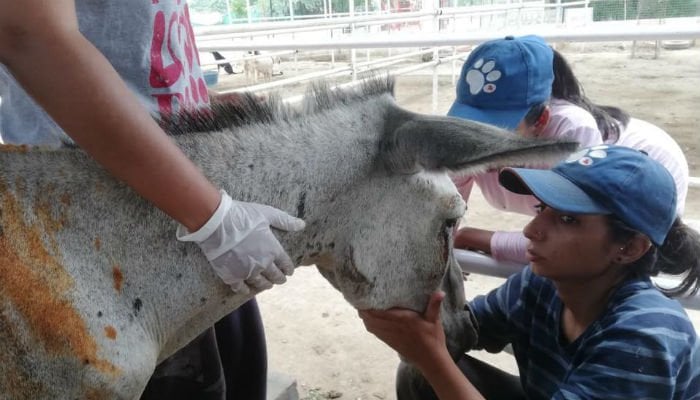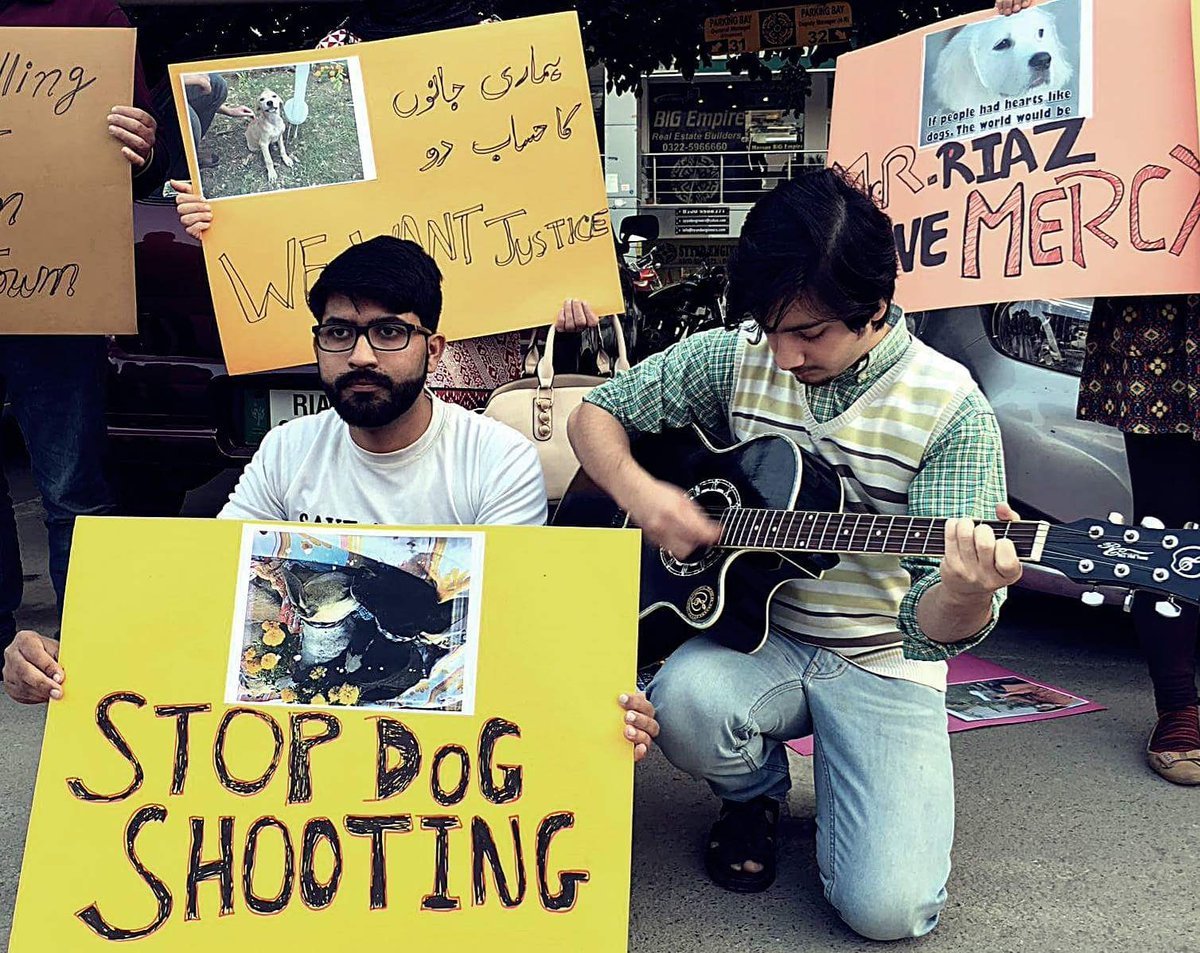"Until one has loved an animal, a part of one's soul remains unawakened." ― Anatole France
Appalling instances of animal cruelty are no rarity in Pakistan. In a country where abject poverty, hunger, malnutrition and environmental disasters claim thousands of human lives every year, animal rights are often placed on the backburner.
But at what expense? That’s a question that needs to be addressed on its own merit, independent of human rights. Why? Because animals are living, sentient beings and have an inherent worth – a value completely separate from their usefulness to humans. The case for animal rights centres upon the concepts of sentience and inherent value: animals are not property or "things," but rather living organisms who can feel pain and emotions, and hence they are worthy of our compassion, respect, friendship, and support.
They are also not "lesser" or "less valuable" than humans. Any amount of pain and death inflicted upon them is unnecessary and unacceptable. Any being with a will to live has a right to live free from pain and suffering, animal rights activists argue.
Both of these concepts, however, are blatantly disregarded on a routine basis in Pakistan. The gruesome torture of a donkey by supporters of a political party in the heated days before the elections serves as a grim reminder of how vulnerable these voiceless beings remain in our society.
‘Hero’ – as he was named by animal welfare non-governmental organisation Ayesha Chundrigar Foundation which rescued him – could not survive his wounds and died in their care a few days later. And he was not the only animal to succumb to this fate.

A mere few days after the elections, a dog was wrapped in a political party’s flag and brutally shot to death. The perpetrators were arrested after a video of the incident went viral, sparking outrage among the masses and prompting authorities to action.
Several other incidences of animal cruelty go unreported and unpunished. And this brings us to the core issue of inadequate deterrence in the legal framework.
Legislation on animal rights – ignored for far too long
Since its birth up until this year, Pakistan relied on the ‘Prevention of Cruelty to Animals Act 1890’ dating back to the British colonial era. The legislation was introduced in 1890 and had not been updated since 1937, reflecting the government’s lack of attention to animal welfare in the country.
This year, thankfully, brought some hope for this ignored community. The Senate Standing Committee on Interior in February 2018 passed a bill titled “Prevention of Cruelty to Animals (Amendment) Bill 2018”, moved by then-senator Karim Ahmed Khawaja. The bill was passed by the National Assembly on May 8, 2018 and was signed into law by the president, bringing some much-needed reforms in the animal welfare sphere.
It’s worth noting that prior to this amendment, the Prevention of Cruelty to Animals Act 1890 imposed a fine of just Rs200 for killing an animal with unnecessary cruelty, or imprisonment for a term which may extend to six months, or both.
The new law, which according to former senator Karim Ahmed Khawaja strives to ensure stricter punishments for the protection of animals from human brutality, has increased the penalty amount to Rs300,000, along with other amendments. (To read the amended act, click here).
“The main question remains of implementation. The new law is only useful when the civil society, animal rights activists, and the general public come forward and register FIRs against perpetrators of animal cruelty,” PPP leader Karim Ahmed Khawaja, who served as senator from March 2012-2018, told Geo.tv.
“We need more awareness for animal rights. [This amended act] is only a start. A lot more needs to be done,” he stressed.
The former senator requested all animal lovers to report cases of animal cruelty to the police. “Only when you report incidences of animal cruelty, the police can pursue the cases as per the law, and the courts can try the perpetrators. This is how you can [deter] animal brutality.”
Pets or strays, animals deserve kindness
Your own pet Persian cat, the neighbour’s dog, the goat you brought home for Eid-ul-Azha, the stray dog that roams your street at nights, the random donkey you see tied to a tree, they all deserve your kindness and respect, said Sunil Jamil, founder of Help Welfare Organisation (HWO) Animal Rescue — a group working to help stray, abandoned and injured animals in Islamabad.
HWO Animal Rescue receives dozens of rescue calls every day, and their group of volunteers rescues 10 to 15 animals a day. “We do whatever we can in our capacity, we have to prioritise injured and handicapped animals that need medical attention and a shelter,” Jamil told Geo.tv.
But all of us, collectively as a society, need to take responsibility of at least those animals who depend on us for love and care, or who can be spared misery and a painful death with our timely intervention, he emphasised.

The most relevant example is of sacrificial animals for the upcoming Eid-ul-Azha. Hundreds of goats and cows die in human care because of, ironically, lack of care. Jamil visits the cattle mandi every Eid to tend to animals that fall sick from mistreatment, dehydration, or other diseases.
“You see goats choking on tight nooses, animals tied under the hot sun where they get dehydrated, when [people] buy animals for sacrifice, don’t they have any obligations towards these innocent beings?” he questioned.
Animal cruelty, Jamil pointed out, can be of two kinds: active and passive. When people randomly hit stray dogs and cats, for example, that’s active cruelty. For someone with pet birds who has confined them to an extremely small cage with not enough room for them to fly, that’s passive cruelty. Either way, it’s the animals who suffer.
What can you do?
Here are some simple tips to follow to make lives easier for animals around us:
• Don’t hurt animals. If you see anyone hurting a stray in the streets, come to its defence and stop the perpetrator. Make sure they understand it’s not okay to mistreat animals.
• If you see a donkey suffering from its heavily loaded cart, talk to its owner. Ask them to be gentle with it, and offer it water to drink.
• If you see goats, sheep, cows tied under the hot sun, talk to their owner to move them to a shaded place, such as under a tree.
• Don’t tie unreasonably short rope to your animals. Make sure they are able to sit comfortably.
• Place a water container for birds at your window sills.
• Offer your spare food to stray cats and dogs, if you can.
• Volunteer at animal shelters or help out in any way you can, such as by donating money or supplying food.
• Register cases against perpetrators of animal cruelty, so that the offenders can be brought to justice under the law.
• Use social media to create awareness for animal rights.
-- Cover image credit: Reuters


